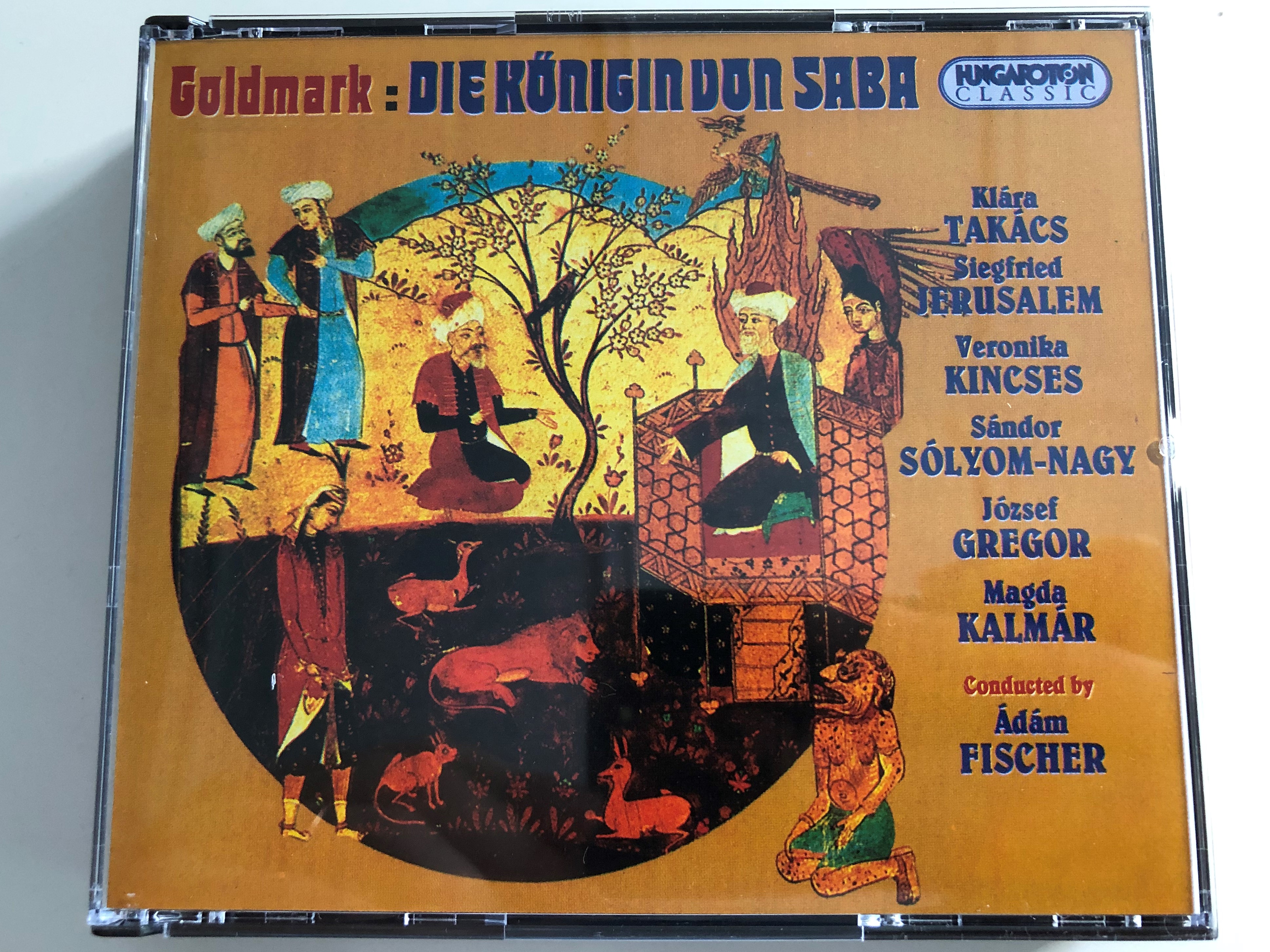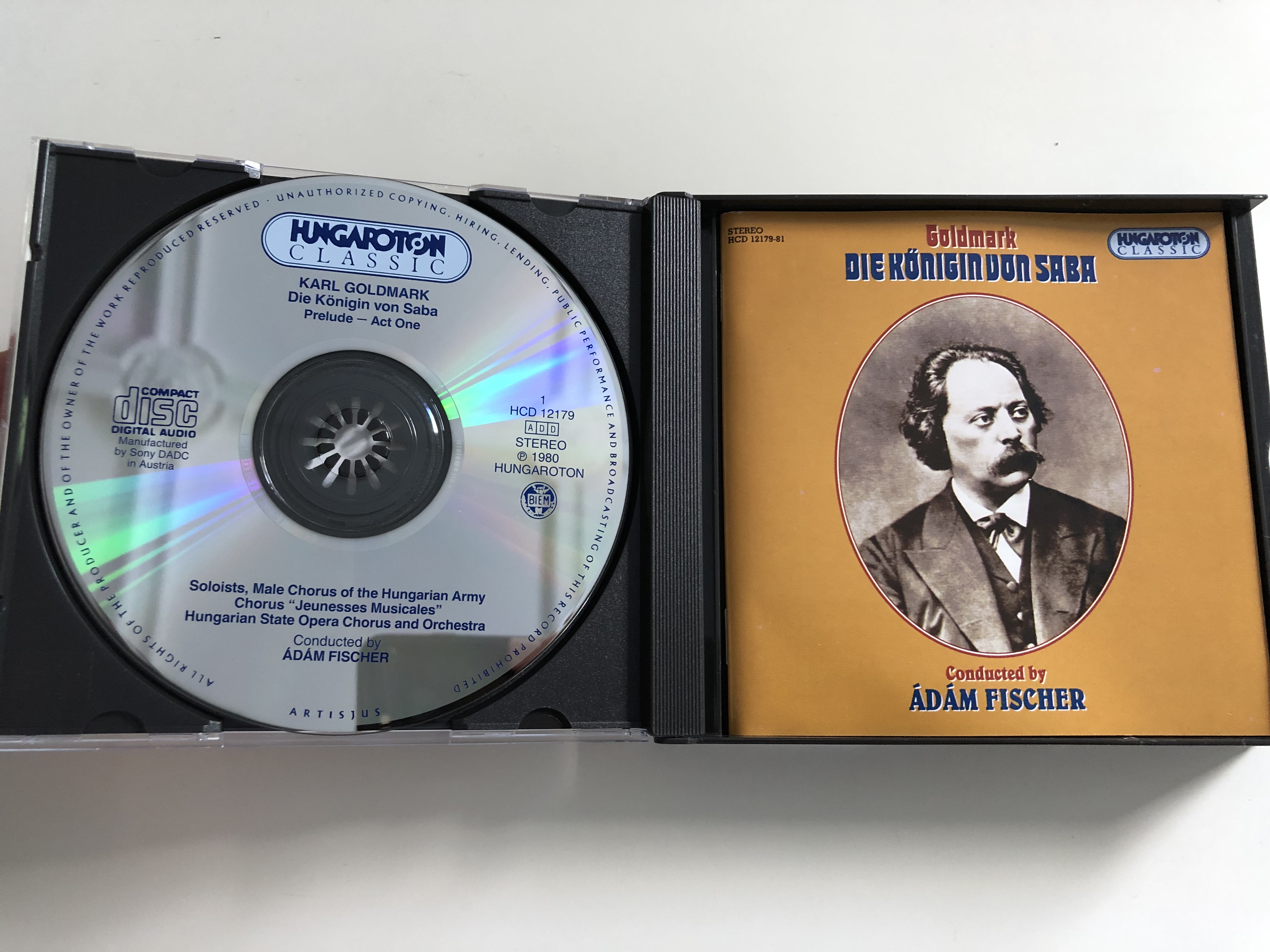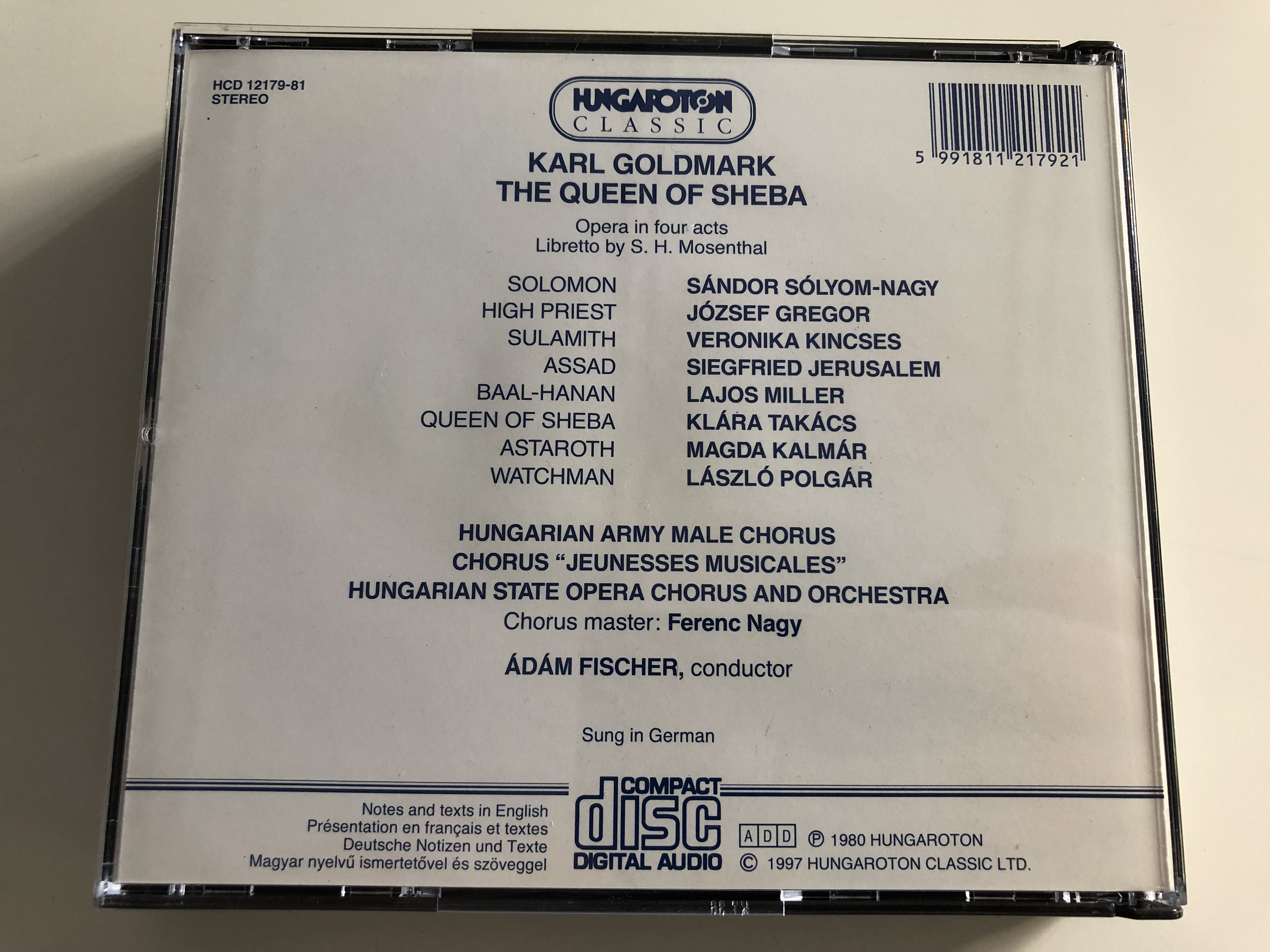Description
Karl Goldmark: Die Königin von Saba / Klára Takács, Siegfried Jerusalem, Veronika Kincses, Magda Kalmár / Conducted by Ádám Fischer / Hungaroton Classic Audio CD 1997 / 3 CD
HCD 12179-81
UPC 5991811217921
MADE IN HUNGARY
TOTAL TIME: 64:46 (CD1), 64:20 (CD2), 64:37 (CD3)
RARE RECORDING SUNG IN GERMAN
- Karl Goldmark: Die Königin von Saba - Complete 1980 studio recording by the Hungarian State Opera, conducted by Ádám Fischer with Siegfried Jerusalem as Assad and Klara Takács at the Queen of Sheba. Label: Hungaroton
| Adam Fischer | Conductor, Primary Artist |
| József Gregor | Bass (Vocal) |
| Hungarian Army Male Chorus | Choir/Chorus |
| Hungarian State Opera Chorus | Choir/Chorus |
| Hungarian State Opera Orchestra | Orchestra |
| Siegfried Jerusalem | Tenor (Vocal) |
| Jeunesses Musicales de France Choir | Choir/Chorus |
| Veronika Kincses | Soprano (Vocal) |
| Judit Lukacs | Balance Engineer |
| Janos Matyas | Producer |
| Lajos Miller | Baritone (Vocal) |
| Salomon Herman Ritter von Mosenthal | Librettist |
| Ferenc Nagy | Choir Master |
| Béla Podör | Choir Master |
| Klára Takács | Mezzo-Soprano (Vocal) |
| Gábor Ugrin | Choir Master |
Tracklist:
Disc 1
Die Königin von Saba, opera, Op. 27
1
Prelude
Karl Goldmark
Adam Fischer
07:54
2
Act 1, Scene 1: "Öffnet euch, Tore"
Karl Goldmark
Adam Fischer
02:29
3
Act 1, Scene 2: "Tritt ohne Zagen ein"
Karl Goldmark
Adam Fischer
03:24
4
Act 1, Scene 3: "Mein Assad kehrt zurück!"
Karl Goldmark
Adam Fischer
07:10
5
Act 1, Scene 4: "Dem König Heil!"
Karl Goldmark
Adam Fischer
04:49
6
Act 1, Scene 5: "Mein Blick gewahrt"
Karl Goldmark
Adam Fischer
01:50
7
Act 1, Scene 6: "Ich les' auf Mein Herr und König"
Karl Goldmark
Adam Fischer
02:35
8
Act 1, Scene 6: "Am Fuß des Libanon"
Karl Goldmark
Adam Fischer
07:52
9
Act 1, Scene 6: "Ob dich ein böser Zauber Tritt mit der Braut"
Karl Goldmark
Adam Fischer
04:09
10
Act 1, Scene 6: March
Karl Goldmark
Adam Fischer
02:53
11
Act 1, Scene 6: "Heil! Der Königin Heil!"
Karl Goldmark
Adam Fischer
08:38
12
Act 1, Scene 7: "Willkommen, edler Gast Dieses Auge, diese Züge"
Karl Goldmark
Adam Fischer
10:50
Disc 2
Die Königin von Saba, opera, Op. 27
1
Night Piece and Festal Music
Karl Goldmark
Adam Fischer
12:16
2
Act 2, Scene 1: "Aus des Jubels Festgepränge"
Karl Goldmark
Adam Fischer
02:02
3
Act 2, Scene 2: "Es bestrickt mir Herz und Sinn"
Karl Goldmark
Adam Fischer
07:04
4
Act 2, Scene 2: "Wie im Schilfe"
Karl Goldmark
Adam Fischer
06:12
5
Act 2, Scene 3: "Magische Töne"
Karl Goldmark
Adam Fischer
04:03
6
Act 2, Scene 3: "Ha, was seh' ich!"
Karl Goldmark
Adam Fischer
07:46
7
Act 2, Scene 4: "Die Sonne steigt"
Karl Goldmark
Adam Fischer
02:40
8
Act 2, Scene 5: "Danket dem Herrn"
Karl Goldmark
Adam Fischer
08:17
9
Act 2, Scene 6: "Wie auf das Saatkorn"
Karl Goldmark
Adam Fischer
07:11
10
Act 2, Scene 7: "Blick empor zu jenen Räumen!"
Karl Goldmark
Adam Fischer
06:58
11
Act 2, Scene 8: "Priester Gottes"
Karl Goldmark
Adam Fischer
12
Act 2, Scene 8: "Ihr Geister, die dem Satan dienen"
Karl Goldmark
Adam Fischer
Disc 3
Die Königin von Saba, opera, Op. 27
1
Act 3, Scene 1: Ballet
Karl Goldmark
Adam Fischer
07:31
2
Act 3, Scene 1: "Rauschet, rauschet durch die Lüfte"
Karl Goldmark
Adam Fischer
07:47
3
Act 3, Scene 2: "Vom Mahle brichst du auf"
Karl Goldmark
Adam Fischer
04:01
4
Act 3, Scene 3: "Noch einmal, wer er immer sei"
Karl Goldmark
Adam Fischer
03:52
5
Act 3, Scene 4: "Weinet, Töchter Salems"
Karl Goldmark
Adam Fischer
02:26
6
Act 3, Scene 4: "Doch eh' ich in des Todes Tal Vor meinem Auge"
Karl Goldmark
Adam Fischer
05:57
7
Act 4, Scene 1: "Wohin lenk' ich"
Karl Goldmark
Adam Fischer
04:48
8
Act 4, Scene 2: "Assad! - Wer ruft mir? O komm, im Schatten dunkler Palmen"
Karl Goldmark
Adam Fischer
07:03
9
Act 4, Scene 3: "Komm, Tod"
Karl Goldmark
Adam Fischer
05:07
10
Act 4, Scene 4: "Unsere Tränen" - "O süßer Traum!"
Karl Goldmark
Adam Fischer
02:43
Die Königin von Saba (The Queen of Sheba) is an opera in four acts by Karl Goldmark. The German libretto by Hermann Salomon Mosenthal sets a love triangle into the context of the Queen of Sheba's visit to the court of King Solomon, recorded in First Kings 10:1-13 (largely copied in 2 Chronicles 9:1–12). The plot centres on a love triangle not found in the Bible between the Queen of Sheba, Assad (an ambassador at the court of Solomon), and Sulamith (Assad's betrothed).
The opera was first performed at the Hofoper (now the State Opera) in Vienna, on 10 March 1875. It became Goldmark's most famous opera and subsequent performances have been mounted internationally.
Synopsis:
Place and Time: Jerusalem and the surrounding desert, 10th Century BC.
Act 1: A hall in Solomon’s palace
Sulamith, the daughter of the High Priest, is anxiously waiting for her fiancé, Assad, to return to court from his diplomatic assignment to plan for the arrival of the Queen of Sheba to the court of King Solomon. The couple are scheduled to marry the following day. Upon his return to the palace, Assad meets with Solomon and reveals to him that he has fallen in love with a mysterious woman among the cedar forests of Lebanon and does not love Sulamith. Before Solomon can reply, the Queen of Sheba arrives with her entourage. As she greets the king, she pulls back her veil, revealing to Assad that she is in fact the mysterious woman he had met on his journey. The queen, however, pretends not to know Assad to his confusion. After the queen leaves, Solomon counsels Assad to not pursue his infatuation but to continue with his marriage to Sulamith.
Act 2: The garden of the palace at night
The Queen of Sheba has slipped away from the social gathering being held in her honor inside the palace. As she reflects on Assad's impending marriage, Astaroth, her slave, informs her that Assad is nearby and then proceeds to lure Assad to her mistress with a seductive oriental vocalise ("Magische Töne"). Assad and the Queen engage in a fervent conversation that climaxes in a passionate duet and embrace. The Guardian of the Temple arrives at daybreak and disrupts their tryst with a call for the Sons of Israel to pray.
The wedding party arrives and Assad and Sulamith are about to be married in front of the Ark of the Covenant when the Queen appears to give a wedding present. The Queen continues to treat Assad like a stranger which throws him into distress. He commits blasphemy by referring to the Queen as his god, causing an uproar which ends the wedding ceremony. Assad is led off to await punishment, most likely his execution.
Act 3: The court of King Solomon
Celebrations in honour of the Queen of Sheba continue with a performance of Bienentanz der Almeen, a ballet, and a bacchanal. Worried for Assad's fate, the Queen pleads for Solomon to give Assad mercy. He refuses and the Queen leaves plotting revenge. Sulamith, along with her companions, enter the court singing a mournful song. She too pleads for Assad's life to be spared in an aria that eventually culminates into a large ensemble. Still unmoved, Solomon replies with an ominous prophecy about Sulamith's fate. Distraught, she leaves the palace for the desert to bewail her impending future.
Act 4: The vicinity of Sulamith's desert retreat
Assad has been banished by Solomon to the desert. The Queen of Sheba seeks him out to attempt to convince him to come back with her to her kingdom. She finds him alone, not too far from Sulamith's retreat, and tries to seduce him. He rejects her advances and in a bitter soliloquy reveals his regret and desire for a death that might redeem his offense against God. Assad then prays for Sulamith, during which time he is engulfed in a violent sandstorm. He is later found barely alive by Sulamith and her companions. He begs for her forgiveness, which she bestows just before he dies in her arms.













































